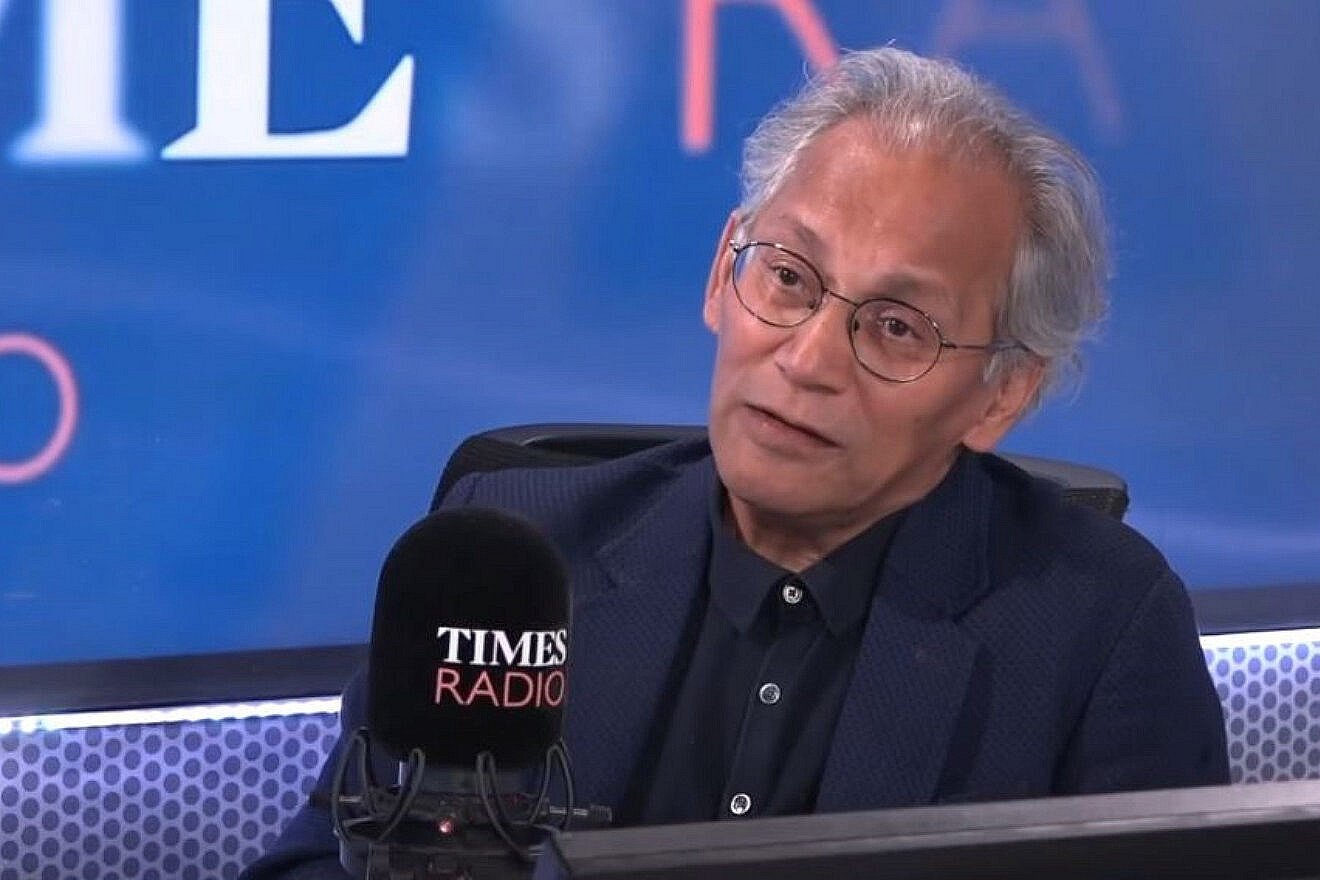 BBC to investigate Arabic channel over Gaza coverage
BBC to investigate Arabic channel over Gaza coverage
David Isaac
“The Arabic service, we are looking at it. We’ve been examining it,” said BBC Chairman Samir Shah.
 BBC Chairman Samir Shah. Credit: Times Radio/YouTube.
BBC Chairman Samir Shah. Credit: Times Radio/YouTube.
[ He was raised a Jain in India before coming to England in 1960 aged 9 and later converting to Islam to marry his wife Belkis. ]
Samir Shah, chairman of the British Broadcasting Corporation (BBC), told Times Radio on May 3 that the broadcaster is investigating anti-Israel bias in its coverage of the Gaza War and will commission an independent investigation of BBC Arabic.
BBC Arabic broadcasts 24 hours a day from London and Cairo to the Middle East via TV, radio and internet.
In conversation with Times Radio host Rod Liddle, Shah, who was appointed BBC chairman in March 2024, said, “I think this whole business of how we’ve covered Israel-Gaza is a proper thing to examine thoroughly, which is why we’re … going to get hold of an independent figure to look at our corporation.”
Liddle said: “You’re still reporting from Israel with a whole bunch of BBC Arabic correspondents, some … who have been found to say the most appalling things about Jewish people, such as, ‘We’re going to burn them until none are left.’ You know, isn’t it time to stop using them?”
Liddle was referring to comments by Samer Elzaenen, a regular contributor to BBC Arabic, who posted antisemitic and anti-Israel comment since 2011, The Telegraph reported.
In one post he wrote: “My message to the Zionist Jews: We are going to take our land back, we love death for Allah’s sake the same way you love life. We shall burn you as Hitler did, but this time we won’t have a single one of you left.”
Elzaenen is one of several BBC Arabic contributors who have been discovered to have posted antisemitic content.
Ahmed Alagha, who has reported for the British public broadcaster since early 2023, described the Israeli army as “the embodiment of filth” and referred to Jews as “the devils of the hypocrites,” according to a Telegraph report last month.
“The Arabic service, we are looking at it. We’ve been examining it,” said Shah.
In March, the Committee for Accuracy in Middle East Reporting and Analysis (CAMERA) issued a report on BBC Arabic, which it noted is the “largest, most heavily funded and most influential foreign-language service” of the BBC.
CAMERA found BBC Arabic had “become synonymous with toxic hostility against Israel and, at times, anti-Jewish racism. It has given a platform to murderous terrorists, presented apologists for terror as independent ‘experts’, allowed extreme views to go unchallenged in interviews and echoed the language of Hamas.”
Following the 33-page CAMERA report, which covered claims spanning four years, Conservative Party Leader Kemi Badenoch in March called for “wholesale reform” of the Arabic-language broadcaster.
Also in March, it came to light that BBC Director-General Tim Davie had repeatedly rejected offers of training on antisemitism.
Lord John Mann, the British government’s official adviser on anti-Jewish discrimination, revealed in an interview with The Telegraph that he had visited the BBC‘s senior leadership to offer training on three occasions since taking up the role in 2019.
The BBC‘s bias against Israel, which goes beyond its Arabic channel, has been repeatedly documented.
According to a Sept. 2024 analysis of 9 million words of BBC output, the broadcaster violated its own editorial guidelines 1,553 times during the four-month period beginning Oct. 7, 2023, repeatedly downplaying Hamas terrorism and presenting Israel as an aggressor.
Among its most recent scandals was the documentary, “Gaza: How to Survive a Warzone,” which utilized a 13-year-old boy as narrator, who turned out to be the son of Hamas Deputy Agriculture Minister Ayman al-Yazouri.
Shah, speaking before the U.K. parliament’s Culture, Media & Sport Committee on March 4, admitted the documentary was a “dagger to the heart” of the BBC‘s neutrality.
The embarrassment led to an unusual apology by the broadcaster, which in a statement, said that “serious flaws” were made “by the production company, and some by the BBC; all of them are unacceptable. BBC News takes full responsibility for these and the impact that these have had on the Corporation’s reputation. We apologise for this.”
At least £400,000 (just over $500,000) of license payers’ cash went to the production company behind the documentary.
“I thought that the Gaza film was deeply flawed, and so does the board,” Shah told Times Radio on Saturday. “We have asked for a report. That report is coming to a conclusion. I haven’t seen it yet. And I really think, right now, we’re right at the middle of this, and let’s just wait to see.”
Despite the BBC‘s evident bias, Shah defended the broadcaster. Citing survey numbers, he said that 37% said that the BBC provides impartial news. The second closest is ITV, a British public broadcast television network, at 6%, and the Guardian and Sky News, both at 6%.
“[W]e still do better than everybody else,” said Shah.
Asked if he himself considers Hamas to be a terrorist group, Shah demurred, saying, “I’m here as a chairman of the BBC.”
“What do you think they are? Do you think they are a convocation of happy little squirrels?” Liddle pressed.
“Right now, I am the chairman of the BBC, and we have taken the view as a board that we continue to use the word terrorist only with attribution,” said Shah.
According to the BBC‘s editorial guidelines posted on its website: “Terrorism is a difficult and emotive subject with significant political overtones and care is required in the use of language that carries value judgements. We should not use the term ‘terrorist’ without attribution.”
BBC has a history of suppressing unflattering reports on its anti-Israel bias. Most egregious is its 20-year suppression of the Balen Report.
Commissioned in 2004, the 20,000-word document, written by senior broadcast journalist Malcolm Balen, looked at hundreds of hours of BBC coverage of the Israel-Arab conflict.
Leaked elements of the report make it clear that the report found BBC coverage to be biased. Only a select few have seen the full document, as the BBC has spent hundreds of thousands of pounds in court to keep it from going public.
Zawartość publikowanych artykułów i materiałów nie reprezentuje poglądów ani opinii Reunion’68,
ani też webmastera Blogu Reunion’68, chyba ze jest to wyraźnie zaznaczone.
Twoje uwagi, linki, własne artykuły lub wiadomości prześlij na adres:
webmaster@reunion68.com







